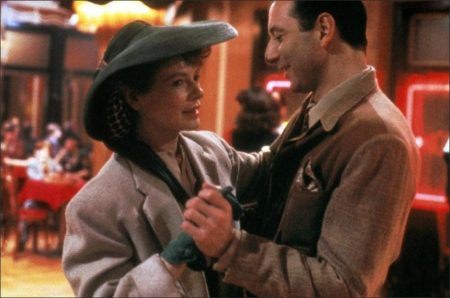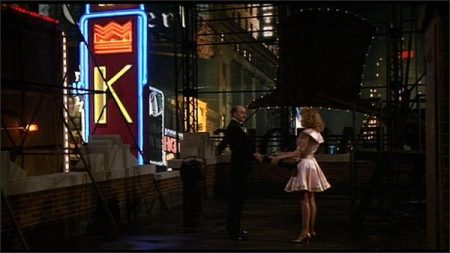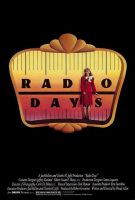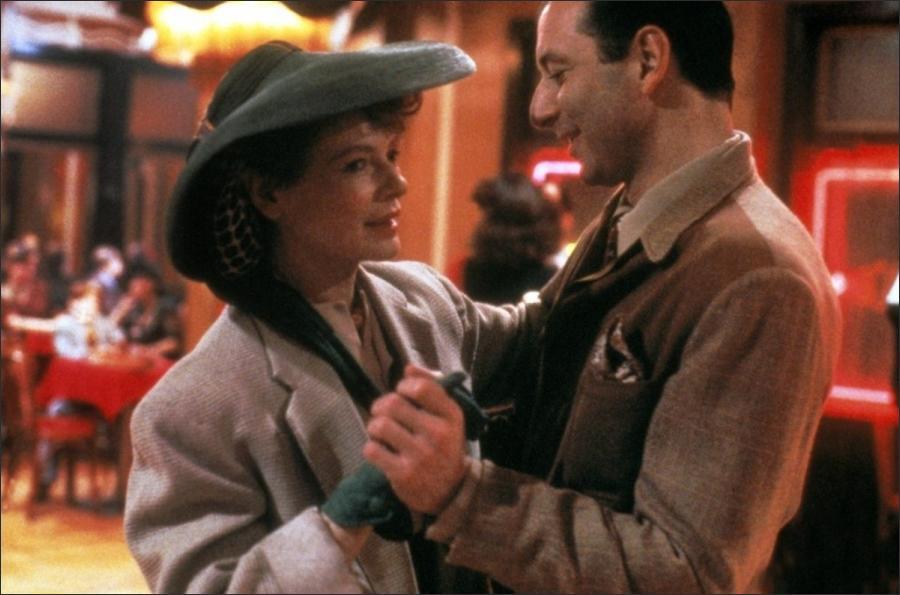Radio Days movie storyline. Joe, a New York Jew, fondly recalls his growing up period in the late 1930s and early 1940s in Rockaway, Queens. He not only lived with his parents – his father who would not divulge his occupation to Joe – but also with his mother’s extended family out of financial necessity.
That family consisted of biological aunts, an uncle by marriage, his grandmother and a cousin. Each member of the family had his or her routine – such as his cousin Ruthie listening to the neighbors’ goings-on through the telephone party line – which grounded the activities. With the diversity of those activities, what tied the family together was listening to the radio.
While the adults listened to a variety of talk shows and game shows – the former often providing an escape of being able to peer into the lives of the rich and famous – Joe loved the serials, and would have done anything to get a Masked Avenger secret decoder ring, the 15-cents which he didn’t have to send away for it. Joe also recalls the back stories of some of the players in the New York radio scene, one in particular, Sally White, who wanted desperately to become a radio star, who worked as a cigarette girl at a Broadway club where many radio personalities hung out, and who was saddled with a non-radio Brooklyn accent.
The radio also was the conduit for breaking news, some on a global scale – such as the US entering the war following the bombing of Pearl Harbor – and some more on a personal scale, both which nonetheless kept the listener glued to the radio for the outcome. But what everyone listened to was the music, especially his single Aunt Bea who wanted to get married but who always seemed to attract the wrong type of man. Joe still places certain songs from the era with certain events in his and his family’s lives. But with each passing year, those memories become less pronounced in his brain.
Radio Days is a 1987 American comedy-drama film written and directed by Woody Allen, who also narrates. The film looks back on an American family’s life during the Golden Age of Radio using both music and memories to tell the story. It stars an ensemble cast including Mia Farrow, Dianne Wiest, Mike Starr, Martin Rosenblatt, Don Pardo, Danielle Ferland, Helen Miller, Julie Kavner, Seth Green, Michael Tucker, Judith Malina, Rebecca Nickels and many more.
Film Review for Radio Days
I can remember what happened to the Lone Ranger in 1949 better than I can remember what happened to me. His adventures struck deeply into my imagination in a way that my own did not, and as I write these words there is almost a physical intensity to my memories of listening to the radio. Television was never the same. Television shows happened in the TV set, but radio shows happened in my head.
That is one of the truths that Woody Allen evokes in “Radio Days,” his comedy about growing up in the 1940s. Another one is that glamor and celebrity meant something in those days. For millions of people living in ordinary homes in ordinary neighborhoods, the radio brought images of beings who lived in a shimmering world of penthouses and nightclubs, in dressing rooms and boudoirs.
The hero of “Radio Days” is an ordinary person like that: an adolescent Jewish kid who grows up in Brooklyn in a house full of relatives and listens passionately to the radio. But the movie is not simply his story. It is also the story of 1940s radio itself, and it re-creates many of the legends that the kid hears.
For example, the story of the burglars who answered the phone in a house they were burgling and won the jackpot on “Name That Tune,” and the prizes were delivered the next day to their bewildered victims. Or the embarrassing plight of the suave radio host who liked to play around and got locked on the roof of a nightclub with the cigarette girl. Or the way the macho heroes of radio adventure serials turned out, in real life, to be short little bald guys. (The one legend Allen leaves out is the scandal of the kiddie-show host who growled “That oughta hold the little bastards” into an open mike.)
“Radio Days” cuts back and forth between the adolescent hero’s working-class neighborhood in Brooklyn and the glamorous radio world of Manhattan. And, like radio, it jumps easily from one level of reality to another. There are autobiographical memories of relatives and school, neighbors and friends, and then there are the glittering radio legends that seeped into these ordinary lives.
Allen is not concerned with creating a story with a beginning and an end, and his movie is more like a revue in which drama is followed by comedy and everything is tied together by music, by dozens of lush arrangements of the hit songs of the 1940s. He has always used popular music in his movies, but never more than this time, where the muscular, romantic confidence of the big-band sound reinforces every memory with the romance of the era.
There are so many characters in “Radio Days” and they are in so many separate vignettes, that it’s hard to give a coherent description of the plot – or plots.
In form and even in mood, it is closest to Federico Fellini’s “Amarcord,” which also was a memory of growing up – of family, religion, sex, local folk legends, scandalous developments and intense romantic yearnings, underlined with wall-to-wall band music. In a way, both films have nostalgia itself as one of their subjects. What they evoke isn’t the long-ago time itself, but the memory of it. There is something about it being past and gone and irretrievable that makes it more precious than it ever was at the time.
Radio Days (1987)
Directed by: Woody Allen
Starring: Mia Farrow, Dianne Wiest, Mike Starr, Martin Rosenblatt, Don Pardo, Danielle Ferland, Helen Miller, Julie Kavner, Seth Green, Michael Tucker, Judith Malina, Rebecca Nickels
Screenplay by: Woody Allen
Production Design by: Santo Loquasto
Cinematography by: Carlo Di Palma
Film Editing by: Susan E. Morse
Costume Design by: Jeffrey Kurland
Set Decoration by: Leslie Bloom, Carol Joffe, George DeTitta Jr.
Art Direction by: Speed Hopkins
Music by: Dick Hyman
KHAA Rating: PG
Distributed by: Orion Pictures
Release Date: January 30, 1987
Views: 211








